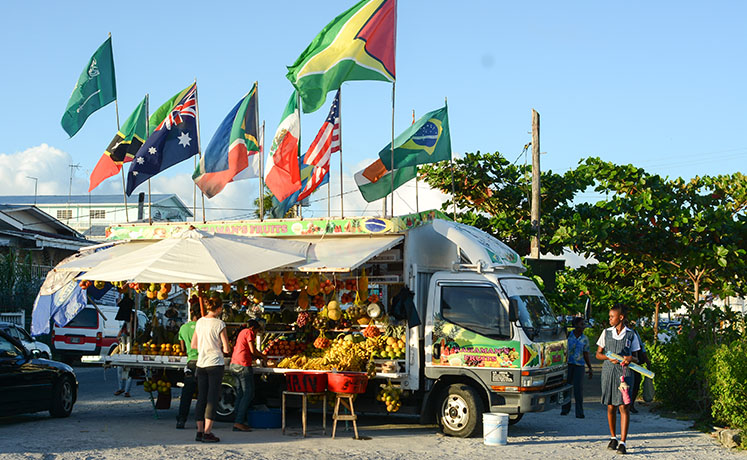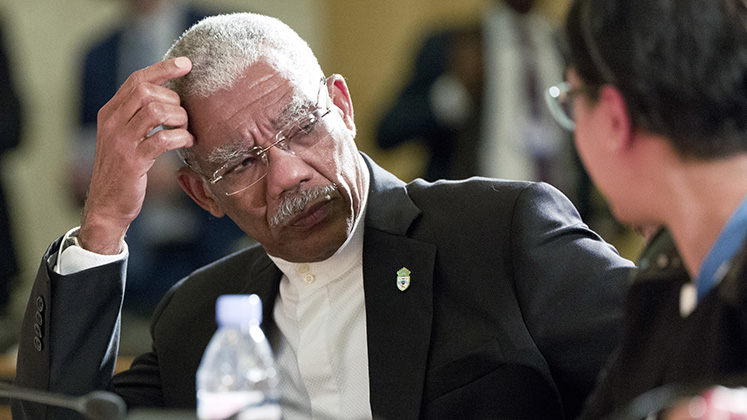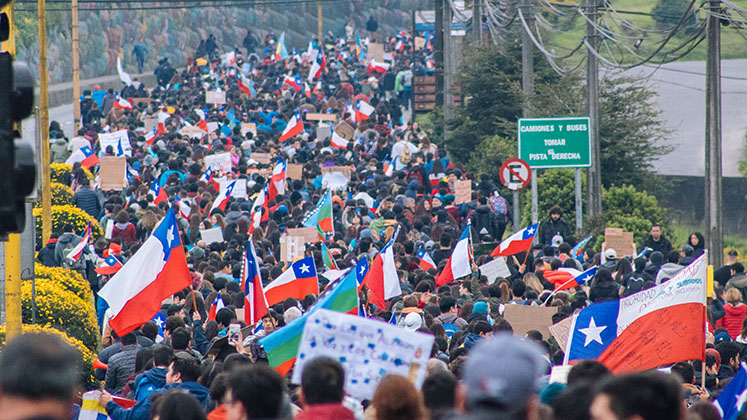 The discovery of oil off Guyana’s coast in 2015 has the potential to significantly reshape the country’s economy and society. But as the lead-up to the 2020 general election on Monday 2 March has shown, oil’s effects on politics could be just as important. Since 2015, the long shadow of ethnicity-based parties has fallen over Georgetown once again despite the hope offered by the recent multi-ethnic coalition headed by David Granger, with the conditions of oil contracts ultimately leading to a political deadlock that could only be broken in the courts. After years of dispute and dysfunctionality, the first task of the next government will be to rebuild trust in the country’s political institutions, writes Holly Eva Ryan (Queen Mary University of London).
The discovery of oil off Guyana’s coast in 2015 has the potential to significantly reshape the country’s economy and society. But as the lead-up to the 2020 general election on Monday 2 March has shown, oil’s effects on politics could be just as important. Since 2015, the long shadow of ethnicity-based parties has fallen over Georgetown once again despite the hope offered by the recent multi-ethnic coalition headed by David Granger, with the conditions of oil contracts ultimately leading to a political deadlock that could only be broken in the courts. After years of dispute and dysfunctionality, the first task of the next government will be to rebuild trust in the country’s political institutions, writes Holly Eva Ryan (Queen Mary University of London).
Guyana’s general election on Monday 2 March 2020 represents the latest stage in a political crisis that has been unfolding ever since the US oil giant ExxonMobil detected significant recoverable deposits off the Essequibo coast.
With a GDP per capita of less than US$4000, Guyana has long been one of the poorest countries in South America, with its top export earners being low-value commodities such as sugar, rice, timber, and bauxite. Optimists are pinning their hopes on oil to transform Guyana’s fortunes, and recently there have been signs that the tide is indeed turning. International consulting firm PricewaterhouseCoopers plans to open an office, celebrity chef Gordon Ramsey is rumoured to be next in line, and a mayoral delegation from Scotland’s oil city Aberdeen has “twinned” with Guyana’s capital city of Georgetown.
This alone makes the 2020 election potentially the most important electoral event since the country gained independence from Britain in 1966.

The long shadow of ethnicity-based politics
The run up to this election has been an important test case for the incumbent coalition government on at least two fronts. First, it has tested their ability to uphold democratic accountability and the rule of law. Second, it has tested their ability to generate consensus on salient questions of development and redistributive justice. But given that their record has not inspired confidence, there is a very real risk that the election on 2 March will foreshadow the return of hyper-polarised, ethnicity-based party alliances.
Guyana’s postcolonial history has been shaped by fierce electoral competition between two main parties: the People’s Progressive Party (PPP) and the People’s National Congress (PNC). These parties chiefly reflect the country’s largest ethnic groups, with the PPP’s base consisting of Indo-Guyanese descendants of indentured labour and the PNC dominated by Afro-Guyanese descendants of enslaved people.
This stark ethnic divide has its origins in the practices and policies of the British colonial administration, but it was reinforced during the Cold War as the United States and the Soviet Union backed opposing sides in a game of geopolitical chess that culminated in a 28 year-long reign for the PNC. The PNC era was marred by vote-rigging and political violence, including the assassination of the Marxist activist and intellectual Dr Walter Rodney in 1980. In the years that followed, many Guyanese left the country, fleeing poverty and violence for better prospects in neighbouring Venezuela, the United States, Canada, and to a lesser extent Europe.
Whilst the return to democracy in 1992 saw increased political freedoms and a change in government, the newly ascendant PPP then went on to dominate the executive for 23 years, during which time it has been accused of marginalising the voices and demands of Afro-Guyanese citizens, indigenous groups, and other minorities.
Oil politics and the 2015 multi-ethnic coalition
When early general elections in May 2015 resulted in a new coalition government dubbed The Partnership for National Unity and Alliance for Change (APNU-AFC), there was a degree of optimism that Guyana had finally turned a corner, leaving behind decades of ethnic division in favour of one of the first multi-ethnic power-sharing arrangements to be formed since the successful independence movement.
On 16 May 2015, former army general David Granger was sworn in as the new president, giving the APNU-AFC coalition a mandate to tackle the country’s high crime rate, unemployment, and corruption, as well as drug and human trafficking. However, Granger’s policy agenda was swiftly overshadowed by a looming set of challenges related to oil, with oil giant ExxonMobil also announcing in 2015 that it had discovered more than 90 metres of high-quality, oil-bearing sandstone reservoirs about 200 km off the Essequibo coastline.
ExxonMobil is one of several oil companies that has been prospecting off the Guyanese coast since the early 2000s. It is the largest prospector, and it was the first to make a significant discovery. Exxon has since made finds at another 14 offshore sites, and several other drilling companies have followed suit.
Total oil finds since 2015 are set to make Guyana one of the top ten per-capita oil producers in the world, and – all things being equal – this could see the country’s GDP triple in the next decade. Perhaps predictably then, new political battle lines have been drawn over who will get the spoils.

Oil and development
The incumbent Granger government has suggested that oil will transform the country, promising that:
The future belongs to young people. The resources derived from economic expansion and diversification will be deployed, primarily, to secure and safeguard our children’s and grandchildren’s future. Young people can be assured of greater opportunities as a result of oil production.
To this end, the APNU-AFU have pledged to create a sovereign wealth fund, and in 2019 they published their Green State Development Strategy: Vision 2040. This lengthy, 183-page document outlines lofty ambitions to diversify the economy into service industries with high value-added, to validate indigenous land titles, to transition to “near 100% renewable energy sources”, and to improve sea defences for the 80 per cent of Guyana’s population and agricultural lands in flood-prone areas below sea-level along the coast.
However, the government has failed to generate consensus and, more importantly, trust. Vision 2040 is big on ideals but vague on implementation. Moreover, the ideals don’t seem to match the coalition’s own record in government. On taking power in 2015, for instance, the APNU-AFU closed down an Amerindian Land Titling Project backed by the Norwegian government and the United Nations Development Programme. Progress on seawall defences and mangrove protection, meanwhile, has been piecemeal at best.
Political opponents, not least the PPP, have also questioned the government’s handling and negotiation of contracts. Under the production sharing agreement (PSA) between ExxonMobil and Guyana, 75 per cent of oil revenue will initially go to the company by way of cost recovery. The remaining 25 per cent will be split 50/50 with the state. The contract includes an effective royalty rate of two per cent on gross earnings, meaning the government will receive a total of 14.5 per cent of initial oil revenues, rising to 59 per cent over time. The deal also exempts Exxon from corporation, excise, and value-added taxes on its earnings from petroleum.
These conditions are hard-wired into the PSA by its own Article 32, which prevents the government from modifying the contract or increasing fiscal obligations on the company. Similar terms have been reached in PSAs with other licensees.
Referring to the relatively low effective-royalty rate, fixed take of “profit oil”, and lack of flexibility for Guyana, critics from the opposition PPP, the media, and civil society have lambasted the PSAs as “colonial contracts“. The IMF and the NGO Global Witness have suggested that these agreements favour the investors.
Political deadlock and the courts
In December 2018, tensions over the PSAs culminated with the Leader of the Opposition and former president Bharrat Jagdeo (PPP) introducing a motion of “no confidence”. In a dramatic turn of events, coalition member Charandas Persaud joined 32 opposition members in voting for the motion. This allowed the opposition to pass the motion by the narrowest possible margin of 33 votes to 32.
According to Guyana’s constitution, “[t]he Cabinet including the President shall resign if the Government is defeated by the vote of a majority of all the elected members of the National Assembly on a vote of confidence”. In such a scenario, an election should take place within three months, but in 2018 the government instead refuted the result, leading to a number of challenges in domestic and regional courts.
Granger’s government disputed the validity of the vote on three main grounds:
- That a “a majority” of elected members present referred not to an absolute majority (more than half) but rather of a simple majority (ie. half plus one).
- That Charandas Persaud was a dual national and therefore not legally entitled to hold office.
- That in its precise wording the bill passed was a “motion of confidence”, which the government’s lawyers argued could only be constitutional if tabled by a member of the government.
When we dissect these arguments, it’s easy to be cynical about the government’s motives. Nowhere does the Guyanese constitution draw such a subtle distinction between an absolute versus simple majority. Moreover, since there are an odd number of elected officials (65) in the Guyanese legislature, a simple majority of half plus one would require a margin of two votes for a win. As far as I have observed, this has quite simply never been the convention in parliament.
On the second count, meanwhile, despite constitutional restrictions on dual nationals holding political office, the governing coalition has itself been rather lax about this in practice. Following the democratic transition, the dual-nationality rule was effectively dropped in a bid to attract professionals back to the country. That Granger’s government was happy to allow Persaud to participate as a dual national when he remained onside makes this argument appear duplicitous.
Lastly, with respect to the wording of the motion, the regional Caribbean Court of Justice (CCJ) held that the reference to “a vote of confidence” in the constitution included “a motion of no confidence” which could be raised by any member of the National Assembly. On 18 June 2019, the CCJ ruled that the motion of “no confidence” was valid.

Deadlock broken: Guyana’s 2020 general election
Again, the CCJ ruling should have kickstarted a new election cycle, but it didn’t. It was not until 25 September 2019 that Granger announced the forthcoming election of 2 March.
There is a widespread perception that the government has been deliberately running down the clock to prevent any new government from making changes to the existing PSAs, and the PPP’s campaign has been making similar noises. Indeed, in December 2019 Exxon Mobil announced “first oil” at least one month ahead of schedule, making it much harder for any incoming government to renegotiate terms. The announcement of “first oil” has also coincided with a number of announcements about small- and medium-scale infrastructure investments that Granger will be able to exploit during the electoral race.
But the APNU-AFU are playing a dangerous game. Their stalling has eroded faith in political institutions, and it has tested popular goodwill towards multi-ethnic power-sharing arrangements. Having attempted to engineer an election on their own terms, what kind of precedent is set for those that will follow in their wake? The task for any future government will be to rebuild public trust in the system by promoting and achieving a more transparent and inclusive form of politics.
As Guyana opens a new chapter in its history by becoming an oil-producing country, it would be a mistake for the country to return to the factionalised, ethnicity-based, tit-for-tat politics of the past. Whichever group triumphs on Monday 2 March, it will be vital for them to reach out beyond historical divides and work towards greening and diversifying the country’s economy while also ensuring that significant structural inequalities are addressed through sustainable redistributive mechanisms.
Notes:
• The views expressed here are of the authors rather than the Centre or the LSE
• Please read our Comments Policy before commenting






Thanks Holly for responding.
You need to re-read Reni Eddo Lodge’s masterpiece “Why I am no longer talking to white people about race” and then reflect on your blog, your response and your sense of entitlement to comment on Guyana and to opine on what is practical for the Guyana government to do.
It appears that you did not understand what I wrote. I suggest you re-read Dieter Helm (The endgame of fossil fuels), Leif Wenar (Blood Oil) and Michael Ross (The oil curse). For an economic development perspective anything by Mark Carney about stranded fossil fuel assets and any World Bank project that promised oil wealth will do. The Chad-Cameroon pipeline is a good start. This will provide a more critical conceptual framework for understanding ‘dynamics’ and ‘context’. You should also look at this Youtube clip “What will oil do for Guyana”. It has had over 200,000 views on Facebook alone: https://www.youtube.com/watch?v=5OaJzvQjr2U
With your interest in elections would it not be more rewarding to look at the rich material available in the UK for example (1) the Brexit fiasco in which a non-binding vote by 17.4M people became the ‘will of the people’; (2) the farcical, undemocratic, feudal constituency system which gave 900,000 Green voters 1 seat and 13,966,451 Conservative Unionist voters 365 seats, or (3) the elective dictatorship first identified by Lord Hailsham in 1976 and now exemplified by the Johnson government?
With your interest in global issues you could develop an authentic and constructive voice by writing about the historic and present debt that the money rich but biodiversity impoverished UK owes to Guyana for mitigating every day the impact of the UK’s unconscionably high greenhouse gas emissions. Or address British amnesia in relation to the slave trade and enslavement of Africans and explore how British reparations could promote justice in Guyana for the descendants of enslaved Africans.
The various attempts to alter the results of Guyana’s election on Monday are attributable to some extent to the writings of foreign commentators insisting that Guyana will get vast oil wealth and undermining the rule of law by shutting out/ignoring the sustainable development alternative required by the Constitution. I will not be able to continue this blog discussion but thank you if you read this far. Feel free to contact me by email. MJ
This blog has reached Guyana. The timing could not be worse. The elections are tomorrow. The blog ignores critical information. Some examples:
1. The blog ignores opposition from people in Guyana to oil production, repeated claims of illegalities in the oil deal, and legal challenge to the petroleum production licence. Like Vanessa Nakate at Davos, Guyanese who don’t fit with the preferred narrative are cropped out. The link does not go to any Guyanese who oppose oil production but to the IMF, IDB, Tom Mitro (an American) and Jan Mangal former adviser to the president under an IDB contract. Mangal is on record urging Guyanese to trust oil companies.
2. The blog cites Global Witness, a London NGO that produced a report which says Guyana should let ExxonMobil take out 8 billion barrels of oil and appears to clear the government of corruption. https://www.stabroeknews.com/2020/02/03/news/guyana/by-pushing-for-more-money-from-illegal-oil-global-witness-is-undermining-the-rule-of-law/
3. The blog repeats GW’s faulty claims about the petroleum agreement and Guyana’s take.
4. The blog ignores the World Bank’s role to make Guyana an oil producer contrary to the Paris Agreement, national policy, national law and Guyana’s abundant resources of wind, water and sunshine. https://theenergymix.com/2020/02/28/world-bank-support-to-guyana-megaproject-undercuts-promise-to-stop-funding-fossils/
5. The “oil may be a blessing” attitude ignores the ‘oil curse’ that enriches oil companies and Western states while inflicting decades of human rights abuses and environmental disasters on third world countries.
6. The blog ignores the climate emergency, market forces, the carbon bubble in the global economy, the inevitable financial disaster of Guyana’s petroleum reserves becoming stranded assets, the dangers of ultra deep water drilling and the grave risk to the Caribbean economies, people and environments from a well blow out.
7. The blog ignores Guyana’s global leadership as a carbon sink and the carbon bomb that is Guyana’s 13 billion barrels of oil and 32 trillion feet of natural gas.
8. The blog ignores the UN including CEDAW’s warnings about the impact of oil on women and girls in Guyana and opposition to oil during Guyana’s UNUPR
9. In commenting on land the blog ignores the critical Amerindian Act 2006 which provides a statutory process for all Amerindian communities, whether indigenous or not, to obtain absolute, unconditional collective titles to vast tracts of land. The Amerindian Land Titling project funded by the Norwegian government involves unelected NGOs who want to replace the Amerindian Act with aboriginal title thereby excluding Amerindian peoples who entered Guyana after colonisation. But then Norway’s treatment of the Sami is hardly a shining example.
A Chatham house researcher accused Global Witness of being “opportunistic, irresponsible and ultimately destructive” to release their report so close to the election.
It is unfortunate that just before the election this blog repeats a narrative of ethnic division that undermines grass roots efforts to reduce tension.
Hi Melinda,
Thanks for your comments. I think that, to some extent, you have misunderstood my intentions in this article. I won’t respond line by line but my thoughts are summarised below in case you are interested.
1. Personally, I am not in favour of oil exploration and I have deep sense of sympathy and solidarity with those in Guyana who are opposing drilling on environmental grounds. This is articulated in my calls for sustainability and greening. At this stage however, I simply don’t think it is realistic to expect the Guyanese government to break with production and ‘leave it in the ground’. Like it or not, the oil finds, contracts and manifesto promises related to oil profits do frame this election. And, it is the election that is the focus of the blog.
2. I think a careful reading of this blog would recognise that it does not call for ethnic-division at all but rather specifically warns and rails against it. Inter-ethnic rivalry has done a great deal of damage to the country historically. Division and prejudice persist today – as you yourself recognise there are tensions. Your comments seem to suggest that the blog is the constitutive force in this. But, I’m just calling it as I see it. If you’re worried about narratives of ethnic division – as I am; and, as I think we all should be – then perhaps its worth directing critical gaze towards politicians who have capitalised on the politics of difference rather than those who are beseeching the politicians (of all stripes) to do better.
3. Given that this is such an important election – one that will have a decisive impact on the country’s future trajectory – I think its crucial that folks do try their best to understand the dynamics and context. Thats what I’m trying to do in this blog. I’m sorry that you think its so terrible and I’m sorry that there there isn’t more space – for example – to focus on the gendered impacts of oil production or the lengthy and contentious history of land titling, which are a worthy and important topics. Personally I’d be delighted if you pitched either of these to the LSE LACC blog.
All best wishes.